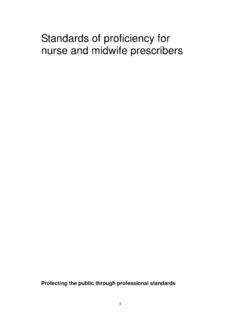Transcription of BTEC - DC's Improbable Science
1 btec Edexcel Level 3 btec Nationals in Health and Social Care For first teaching September 2007 Edexcel Level 3 btec Nationals in Health and Social Care February 2007 Specification Edexcel, a Pearson company, is the UK s largest awarding body offering academic and vocational qualifications and testing to more than 25,000 schools, colleges, employers and other places of learning here and in over 100 countries worldwide. We deliver million exam scripts each year, with 3 million marked onscreen in 2005. Our qualifications include GCSE, AS and A Level, GNVQ, NVQ and the btec suite of vocational qualifications from entry level to btec Higher National Diplomas and Foundation Degrees. We also manage the data collection, marking and distribution of the National Curriculum Tests at Key Stages 2 and 3, and the Year 7 Progress Tests. References to third party material made in this specification are made in good faith.
2 Edexcel does not endorse, approve or accept responsibility for the content of materials, which may be subject to change, or any opinions expressed therein. (Material may include textbooks, journals, magazines and other publications and websites.) Authorised by Roger Beard Prepared by Julie Perkins Publications Code BN018467 All the material in this publication is copyright Edexcel Limited 2007 Contents Ten principles for delivering an Edexcel Level 3 btec National qualification 1 What are btec Nationals? 3 btec National Award 3 btec National Certificate 3 btec National Diploma 4 National Occupational Standards (NOS) 4 Key features of the btec Nationals in Health and Social Care 5 Rationale of the btec Nationals in Health and Social Care 5 Structure of the qualification 6 Edexcel Level 3 btec National Award in Health and Social Care 6 Edexcel Level 3 btec National Certificate in Health and Social Care 8 Edexcel Level 3 btec National Certificate in Health and Social Care (Social Care) 10 Edexcel Level 3 btec National Certificate in Health and Social Care (Health Studies) 12 Edexcel Level 3 btec National Certificate in Health and Social Care (Health Sciences) 14 Edexcel Level 3 btec National Diploma in Health and Social Care 16 Edexcel Level 3 btec National Diploma in Health and Social Care (Social Care)
3 18 Edexcel Level 3 btec National Diploma in Health and Social Care (Health Studies) 20 Edexcel Level 3 btec National Diploma in Health and Social Care (Health Sciences) 22 Unit format 24 Units 27 Unit 1: Developing Effective Communication in Health and Social Care 29 Unit 2: Equality, Diversity and Rights in Health and Social Care 43 Unit 3: Health, Safety and Security in Health and Social Care 57 Unit 4: Development Through the Life Stages 71 Unit 5: Fundamentals of Anatomy and Physiology for Health and Social Care 83 Unit 6: Personal and Professional Development in Health and Social Care 97 Unit 7: Sociological Perspectives for Health and Social Care 113 Unit 8: Psychological Perspectives for Health and Social Care 123 Unit 9: Values and Planning in Social Care 133 Unit 10: Caring for Children and Young People 143 Unit 11: Supporting and Protecting Adults 157 Unit 12: Public Health 169 Unit 13: Physiology of Fluid Balance 181 Unit 14: Physiological Disorders 193 Unit 15: Biochemistry for Health 205 Unit 16: Science in Practice for Health 217 Unit 17: Working in the Social Care Sector 231 Unit 18: Working in the Health Sector 245 Unit 19: Applied Sociological Perspectives for Health and Social Care 259 Unit 20: Health Education 271 Unit 21: Nutrition for Health and Social Care 283 Unit 22: Research Methodology for Health and Social Care 297 Unit 23: Complementary Therapies for Health and Social Care 309 Unit 24: Introduction to Counselling Skills for Health and Social Care 321 Unit 25: Coping with Change in a Health and Social Care Context 329 Unit 26: Caring for Individuals with Additional Needs 339 Unit 27: Dealing with Challenging Behaviour 349 Unit 28: Caring for Older People 359 Unit 29.
4 Applied Psychological Perspectives for Health and Social Care 369 Unit 30: Health Psychology 383 Unit 31: Physiology of Co-ordination 393 Unit 32: Mobility and Exercise for Health and Social Care 405 Unit 33: Physical Science for Health 417 Unit 34: Human Inheritance for Health and Social Care 429 Unit 35: Introduction to Microbiology for Health and Social Care 439 Unit 36: Communicable Diseases 449 Unit 37: Defence against Disease 459 Unit 38: Environmental Health 469 Unit 39: Infection Prevention and Control 481 Unit 40: Dementia Care 493 Unit 41: Working with Medication in Health and Social Care 505 Unit 42: Support Work in Social Care 515 Unit 43: Technology in Health and Social Care Services 527 Unit 44: Vocational Experience for Health and Social Care 537 Unit 45: Competence-based Vocational Experience for Health and Social Care 549 Unit 46: Independent Learning in Health and Social Care 561 Unit 47: Academic Literacy in the Health and Social Care Sectors 573 Unit 48: Social Policy for Health and Social Care 585 Unit 49.
5 Exploring Personal and Professional Development in Health and Social Care 597 Assessment and grading 609 Grading domains 609 Quality assurance 610 Approval 610 Risk assessment 610 Internal verification 611 External verification 611 Calculation of the qualification grade 611 Awarding a qualification grade 611 Unit points 612 Grade boundaries and UCAS points (as of 1st January 2007) 612 Programme design and delivery 613 Mode of delivery 613 Resources 613 Delivery approach 614 Accreditation of Prior Learning (APL) 614 Meeting local needs 614 Limitations on variations from standard specifications 615 Access and recruitment 615 Restrictions on learner entry 616 Access arrangements and special considerations 616 The Edexcel btec Qualification framework for the health and social care sector 617 Further information 618 Useful publications 618 How to obtain National Occupational Standards 619 Professional development and training 619 Annexe A 621 QCA codes 621 Annexe B 623 Grading domains.
6 Level 3 btec generic grading domains 623 Annexe C 627 Key skills 627 Annexe D 633 National Occupational Standards/mapping with NVQs 633 Annexe E 639 National Occupational Standards/mapping with NVQs 639 Annexe F 643 btec National in Health Studies old (specification end date 31st August 2007)/ btec National in Health and Social Care new (specification start date 1st September 2007) unit mapping overview 643 btec National in Care old (specification end date 31st August 2007)/ btec National in Health and Social Care new (specification start date 1st September 2007) unit mapping overview 646 Annexe G 649 Wider curriculum mapping 649 Annexe H 653 Mapping to NHS Knowledge and Skills framework 653 Annexe I 657 Mapping to Skills for Care/Northern Ireland Social Care Council Induction Standards 657 Annexe J 659 Key words and concepts from Health and Social Care National Occupational Standards 659 Annexe K 661 Contextualised Grading Grid for Unit 47.
7 Academic Literacy in the Health and Social Care Sectors 661 BN018467 Specification Edexcel Level 3 btec Nationals in Health and Social Care Issue 1 February 2007 Edexcel Limited 2007 1 Ten principles for delivering an Edexcel Level 3 btec National qualification This specification contains the rules and regulations, along with the units and associated guidance, to enable centres to design and deliver a programme of learning for the Edexcel Level 3 btec Nationals in Health and Social Care. The qualification structures set out the permitted combination of units learners need to complete the qualification. Each unit sets out the learning outcomes and grading criteria along with content, advice and guidance regarding appropriate delivery and assessment strategies. The following generic principles need to be adhered to so that a btec qualification is delivered to the appropriate standard.
8 1 The specification: The specification gives the information needed for the successful delivery and achievement of the units and the qualification as a whole. The specification is of importance to the learner and the tutor alike. Individual units can be delivered and studied in isolation but the learner and the deliverer should have access to the full information provided to support the programme of learning. 2 The website: Centres need to make regular use of the Edexcel website ( ) to ensure that they have the most up-to-date information. In particular, the requirements for the external verification of the qualification receive regular updates, and appropriate information for centres is posted on the website. It is the responsibility of the centre to ensure that they are familiar with the latest btec NQF Level 2/3 (including Short Courses at Levels 1 3) Handbook and that they implement any related policy documentation which may have been posted on the website.
9 3 Policy: This specification gives details of our assessment and quality assurance procedures. It includes advice about our policy regarding access to our qualifications, the design of programmes of study and delivery modes. Centres must ensure that they follow the procedures and conform to the policies outlined. 4 Recruitment: Centres are required to recruit learners with integrity. A fundamental aspect of this integrity is that centres take appropriate steps to assess each applicant s potential and make a professional judgement about the applicant s ability to be able to successfully complete the programme of study and achieve the qualification. Centres should ensure that applicants have appropriate information and advice about the qualifications and that the qualification will meet their needs. BN018467 Specification Edexcel Level 3 btec Nationals in Health and Social Care Issue 1 February 2007 Edexcel Limited 2007 2 5 Assessment: Centres are required to use this specification to design and deliver a programme of learning that will enable learners to achieve the grading criteria stipulated in the unit grading grids.
10 The programme of learning should consist of assignments which provide the opportunity for coverage of all grading criteria as set out in the grading grid for each unit. Assignments must be reliable and fit for purpose, giving learners every opportunity to generate evidence which satisfies the grading criteria. Centres should use a variety of assessment methods, including case studies, assignments and work-based assessments, along with projects, performance observation and time-constrained assessments where appropriate. 6 Assignments: Centres are encouraged to apply the grading criteria in a practical way. They should provide, wherever possible, a realistic scenario for learners to work with, and make maximum use of practical activities and work experience. The creation of assignments that are fit for purpose is vital to the learner s achievement. 7 National Qualifications framework (NQF): These qualifications have been accredited to the NQF and are eligible for public funding as determined by the DfES under Sections 96 and 97 of the Learning and Skills Act 2000.









